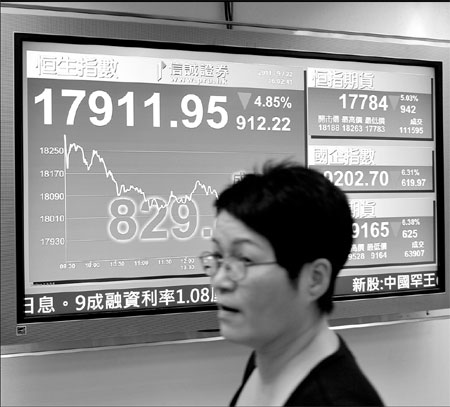Stocks tumble nearly 5% on pessimistic outlook
Updated: 2011-09-23 07:50
By George Ng(HK Edition)
|
|||||||
|
A broker walks past a screen indicating the Hang Seng Index at a securities house in Hong Kong on Thursday. Laurent Fievet / AFP |
US Federal Reserve's plan to stimulate economy fails to excite investors
Hong Kong shares suffered another hard hit on Thursday, with the benchmark index falling nearly 5 percent, after the US Federal Reserve's plan to stimulate the economy failed to excite investors.
Expectations that a new round of monetary stimulus would be launched has given some support to share prices recently. However, the Fed's announcement of its "Operation Twist" program - instead of QE3 - failed to reassure investors who have been worrying about a double-dip recession in developed economies.
The program intends to trade in $400 billion worth of short-term bonds for the same amount of longer-term bonds, with the aim of bringing down long-term yields.
The Fed's warning of "significant downside risks to the economic outlook" and a closely-watched survey from financial information company Markit indicating potential recessionary conditions in the euro zone economy only added to the worries. Markit's monthly purchasing managers' index for the euro zone fell to 49.2 in September, its lowest level since July 2009, from 50.7 in the previous month.
Sentiment was also damaged by the news that Moody's Investors Service has lowered its debt ratings for Bank of America, Citigroup and Wells Fargo on the grounds that the US government is becoming less comfortable about bailing out large troubled lenders.
The government is "more likely now than during the financial crisis to allow a large bank to fail should it become financially troubled", said the ratings agency on Wednesday.
Meanwhile, Standard & Poor's' downgrades on several Italian lenders on Wednesday - a ripple effect following the agency's decision to cut Italy's sovereign rating earlier this week - also aggravated the sell-off of banking stocks.
"Under the surface, we are moving quickly into a secondary credit crisis," said Angus Gluskie, a fund manager at White Funds Management in Sydney.
"All underlying measures of credit risk are rising and there are numerous examples of banks having to resort to unusual measures to obtain funding. The Fed delivered no surprises, leaving markets facing sovereign-debt issues in Europe to which there is still no clear solution," he added.
The Hang Seng Index slumped 912 points, or 4.9 percent, to 17911.95 at the close, its lowest close since July 2009. With Thursday's sell-off and the high odds of a further slide on Friday, the benchmark index is poised for its worst monthly loss in almost three years.
"Other negatives for Hong Kong are that Japan is closed tomorrow, which means the HSI will become the prime banker for raising dollars without currency risk," said a Hong Kong-based trader, predicting that margin calls could result in more selling early Friday.
Mainland firms were hit harder on Thursday, with the Hang Seng China Enterprises Index, which traces major mainland companies, plummeting 6.3 percent to 9202.70, its biggest drop since March 2009, after a report showed the country's manufacturing may contract for a third consecutive month in September.
A preliminary reading of 49.4 for PMI on the mainland released by HSBC and Markit on Thursday indicated that the manufacturing sector's operating conditions continued to deteriorate in September. The final readings for August and July were 49.9 and 49.3 respectfully, both below the expansion-contraction threshold of 50.
Total turnover climbed to nearly HK$83 billion - up 26.3 percent from Wednesday - which was the highest daily turnover in three weeks.
george@chinadailyhk.com
Bloomberg and Reuters contributed to this story.
China Daily
(HK Edition 09/23/2011 page2)
